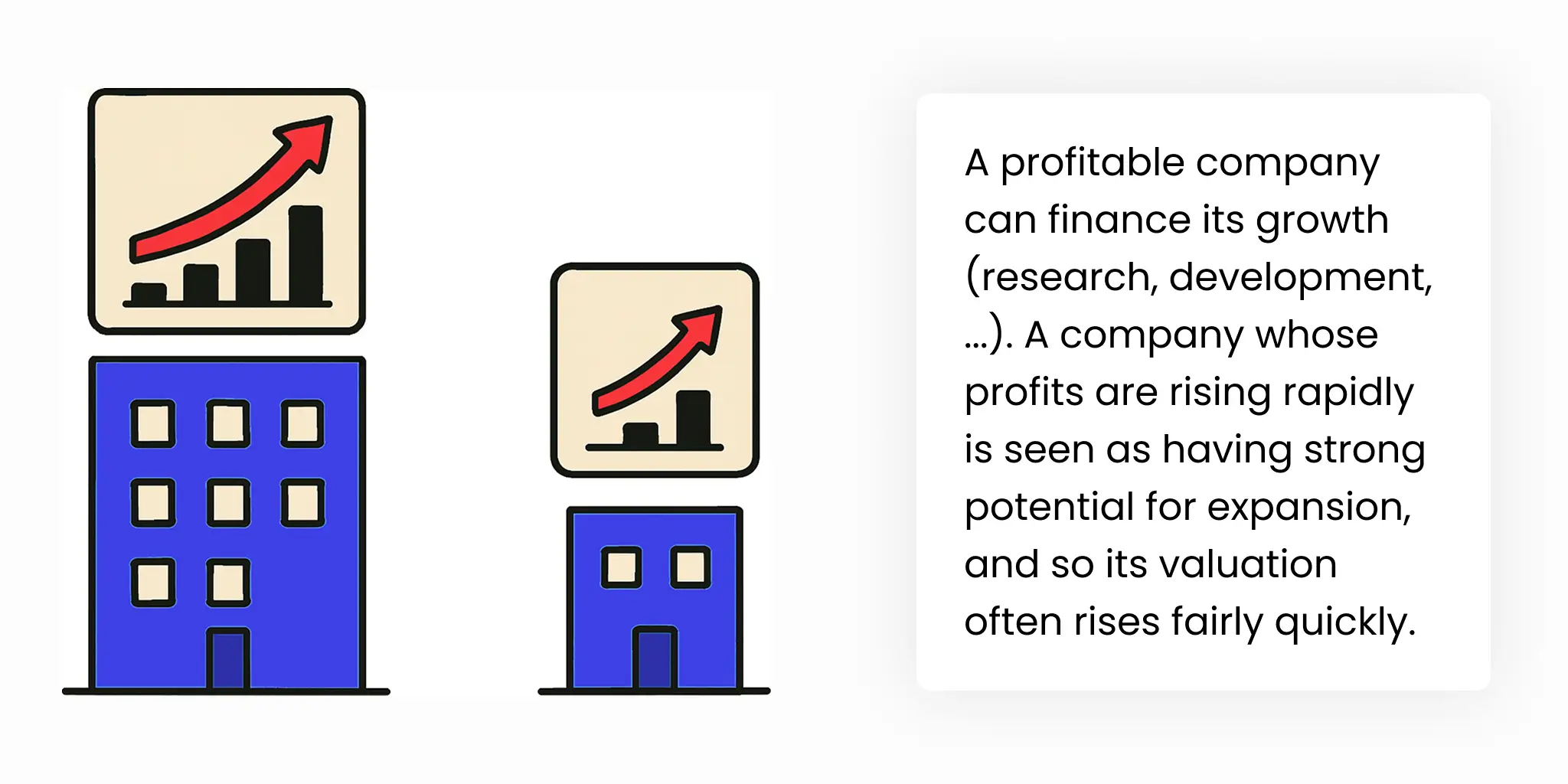What are the factors that affect stock prices?
Introduction
The price of stocks represents the value at which a stock is bought or sold on the stock market. But fundamentally, why do prices go up and down over time? I have already explained this slightly in another tutorial by discussing the principles of supply and demand, but here I will present in more detail the factors that have an impact on stock prices. Why? Simply because it's crucial for anyone who wants to invest in an informed and strategic manner. So, in this tutorial, I will try to cover as many factors as possible that affect stock prices:
- Structural factors related to the company, such as profits (the earnings made by the company), dividends (the payments made to shareholders), debt (the money that the company has to repay), and the industry sector (the type of industry in which the company operates).
- Global economic factors (also called macroeconomic cyclical factors, but the term is a bit daunting, which I prefer to avoid), including monetary policies (decisions made by central banks regarding interest rates and money supply), investor psychology (the emotions and perceptions of investors that influence their decisions), and economic cycles (natural fluctuations of the economy, such as periods of growth and recession).
- Other important factors such as the law of supply and demand in the stock market and certain company-specific events.
I have already given you a lot of vocabulary that can be terrifying, I know. But I promise, it's not that complicated, and I will do my best to explain it to you very simply. If you're comfortable, we can start with the structural factors related to the company.
Structural factors related to the company
1. The company’s profits
The value of a stock often depends on the profits generated by the company, that is to say, the amount remaining once all expenses have been paid, which reflects the actual profitability of the activity. The more solid and regular profits a company shows, the more it inevitably attracts the trust of investors.
This is logical in itself. Stable or growing profits indicate effective management and a robust business model. A profitable company can finance its growth (research, development, international expansion) without systematically resorting to debt. For example, if a company announces a quarterly profit that exceeds expectations, it can lead to an immediate increase in the stock price, as it reassures about the future ability to generate profit.
If we look beyond just the absolute amount of profits, their evolution also matters, that is to say, the growth rate of profits. A company whose profits are growing rapidly is perceived as having strong expansion potential, and therefore its valuation often rises quite quickly.
 "A profitable company can finance its growth. A company whose profits are rising rapidly is considered to have strong expansion potential, and its valuation therefore often rises fairly quickly."
"A profitable company can finance its growth. A company whose profits are rising rapidly is considered to have strong expansion potential, and its valuation therefore often rises fairly quickly."While we're at it, I also need to talk to you about the price-to-earnings ratio (PER). It is used to compare the valuation of a company to its results, and is calculated as follows: PER = Price of the stock / Earnings per stock (EPS). For example, if a company has a stock price of €50 and earnings per stock of €5, the PER will be 10. This means that investors are willing to pay 10 times the annual profits of the company for each stock. Anyway, it may not be super important for you, but you will surely see this term from time to time, so I might as well talk to you about it.
Why are company profits important to investors?
- Because they are used to set employees' salaries.
- Because they show whether the company can pay dividends to its competitors.
- Because they show the company's profitability and influence the value of its stocks.
- Because they depend solely on the amount of debt.
2. Dividends paid to shareholders
Dividends represent a portion of the company's profits that are regularly distributed to shareholders. Like profits, a stable or growing dividend policy attracts investors looking for regular income, which can increase demand for the stock and therefore its price. There are two important things here: the amount of dividends but also the regularity of the payments.
An unexpected interruption or decrease in dividends is generally perceived negatively, as it reflects potential financial difficulties or a change in strategic priorities. For your information, certain industrial sectors, such as utilities, are generally known for their generous dividend policies, while others prefer to retain earnings to support their growth.
3. Debt and how it affects stock prices
The debt of a company also plays an important role in determining the price of its stocks. A high level of debt can have several effects.
On one hand, a highly indebted company may be perceived as less financially stable, as investors may fear that it will have difficulty repaying its debts, especially if its profits decline. Would you lend money to an indebted person who doesn't know how to pay it back? It's exactly the same principle that applies here.
On the other hand, debt can also play a positive role if it is well managed, as it allows for boosting profits by using borrowed funds to generate more income than the cost of the debt, which often attracts investors. However, it should be noted that if interest rates are high, it necessarily increases the costs of the company and reduces the net profits available for shareholders, which can lead to a decrease in the stock price.
Finally, a company that is too heavily indebted may have difficulties raising funds to finance its future growth, which limits its expansion possibilities. In summary, although debt can offer growth opportunities, it is important to be cautious as it also carries risks depending on the situation.
What impact does a high level of debt have on a company's stock price?
- It guarantees an automatic rise in the share price.
- It can worry investors, as the company may have difficulty repaying its debts.
- It means that the company no longer needs to make a profit.
- It makes the company completely independent of interest rates.
4. The industrial sector and its specificities
Each industrial sector has its own characteristics that influence the fluctuation of stock prices. There are mainly two types of sectors: cyclical sectors and defensive sectors.
The so-called "cyclical" sectors depend heavily on the health of the economy. For example, the automotive or tourism industries see their corporate profits vary according to the phases of the economic cycle. In general, people go on holiday more often in summer than at other times of the year. Defensive sectors, on the other hand, are related to areas such as health, food, or community services. Their profits are generally stable even in times of crisis, as the demand for their products remains constant.
Global economic factors that affect stock prices
1. Monetary policies and interest rates
Basically, central banks, such as the European Central Bank (ECB), conduct monetary policies. By controlling interest rates and managing the money available in the markets, these institutions directly influence the markets.
For example, with interest rates, when rates are low, it is cheaper for businesses and individuals to borrow, which stimulates investment and consumption. Conversely, when rates are high, credit becomes more expensive, which slows down business growth. Investors then prefer safer investments, which reduces demand for stocks and causes their prices to fall.
In short, monetary policies can quickly become very complicated and that is not my goal here. Just remember that an unexpected announcement regarding a change in monetary policy can cause sharp movements in stock prices.
Why can a fall in interest rates lead to a rise in stock prices?
- Because it reduces corporate profits, which reassures investors.
- Because it makes passbook savings more attractive than equities.
- Because it facilitates access to credit, stimulates the economy and encourages investors to seek better returns on the stock market.
- Because it forces companies to repay their debts immediately.
2. Psychology and sentiment of investors
This factor is, in my opinion, the most well-known and logical. When investors are confident, the market tends to be on the rise. On the other hand, when confidence decreases, fear can lead to massive selling. The market is self-fulfilling in the sense that if everyone thinks it will fall, it falls. If everyone thinks it will rise, it rises. It's as simple as that.
 One of the factors influencing stock prices is sentiment. If people panic and sell all their stocks, share prices fall.
One of the factors influencing stock prices is sentiment. If people panic and sell all their stocks, share prices fall.The decisions of central banks, as I mentioned earlier, have a significant impact on these sentiments. A sudden increase in interest rates can reduce investor enthusiasm, while a decrease can generate excessive optimism.
3. Key economic data influencing the markets
Macroeconomic indicators (data that provide an overview of the health of the economy) play a crucial role in the fluctuation of stock prices.
Several factors have certain influences, such as interest rates, which I mentioned earlier. But also inflation (the general rise in prices), because if it is high, it can reduce the profitability of companies by increasing their operating costs. It can also prompt central banks to raise interest rates, negatively impacting stock prices. A growing economy also fosters investor confidence and can lead to an increase in stock prices. Data on GDP and employment are often closely monitored to assess this growth. But that's starting to be a lot of things to watch out for, isn't it?
What economic factor is often monitored to assess the health of the economy and its potential impact on financial markets?
- Growth in corporate dividends, as this is directly linked to profitability.
- Inflation, because it can increase business costs and lead to higher interest rates.
- The amount of cash in circulation, which directly determines demand for stocks.
- Changes in wages, which determine the price of stocks in the financial sectors.
Is that all? Do only these factors affect stock prices?
No, that would be too simple. Here are some other factors that affect the price of stocks, including the famous law of supply and demand.
1. Law of supply and demand in the stock market
This is a simple principle, but extremely powerful. Here we talk about supply as the volume of stocks available for sale by existing shareholders or during new issuances by the company, and demand as the number of investors wishing to acquire these stocks at a given moment.
The price of a stock is formed at the intersection between the two. When demand exceeds supply, buyers are willing to pay more to obtain the stock, which drives up prices. Conversely, if supply exceeds demand, sellers have to lower their prices to attract buyers, resulting in a decrease in price.
The political or geopolitical context also has a certain influence. An uncertain election or a major international conflict can generate a wave of sales due to fears of economic consequences, while a reassuring trade agreement can revive demand.
According to the law of supply and demand, what can cause the price of a stock to rise?
- An increase in the number of stocks offered for sale on the market.
- A fall in investor interest in the sector.
- Demand outstripping supply, with buyers prepared to pay more.
- An excess of supply over demand, forcing sellers to raise prices.
2. Specific events related to the company
Certain internal events within a company can also trigger rapid variations in the price of its stocks. These factors often have an immediate impact on the supply and demand for stocks. Typical examples include product launches, product recalls (a massive recall due to defects), accounting scandals (the discovery of irregularities in the accounts), etc.
3. Financial operations impacting valuation
It should also be noted that companies sometimes carry out certain financial operations, which can significantly change the unit value of a stock and directly influence supply and demand. For example:
- Capital increase: when a company issues new stocks, it increases the volume of stocks in circulation. This operation can lead to dilution for existing shareholders, as their relative stock in the company decreases if the demand from new buyers does not absorb the entire additional supply.
- Share buyback: on the contrary, when a company buys back its own stocks, it reduces the number available on the market. This mechanism tends to strengthen the unit value of each remaining stock, as profits are distributed over a more limited number of stocks.
- Mergers-acquisitions or spin-offs: mergers, acquisitions or separations of companies can also affect the price of stocks, depending on whether investors believe that it will bring value or not.
Which of the following statements is not true of corporate finance transactions?
- A capital increase can dilute the shareholding of existing stockholders.
- A stock buyback tends to increase the unit value of the remaining stocks.
- A merger is always seen as good news by investors.
- These operations can influence the supply of and demand for stock.
4. Influence of political and geopolitical context
Of course, I couldn't overlook this, but the political and geopolitical context is among the factors that affect stock prices. Political instability, such as an unexpected change of government, contested elections or major legislative reforms, can decrease the demand from stockholder buyers due to fear of economic uncertainties.
Geopolitical conflicts (trade wars, diplomatic tensions, international sanctions) also impact the supply and demand for stocks, especially in sectors sensitive to exports or dependent on raw materials. For example, an announcement of sanctions against an oil-exporting country can lead to a surge in the stock prices of energy companies (local or international).
The volume of stock issuance during major political events can also change: some groups delay their initial public offerings (IPOs) or fundraising during periods of uncertainty. In short, all of this is quite difficult to predict, but in general, it has a big impact on the price of your stocks.
What impact can geopolitical tensions, such as economic sanctions, have on financial markets?
- They systematically lead to a fall in stock prices in all sectors.
- They only affect local companies and have no impact on multinationals.
- They can create uncertainty, altering the demand for stocks, especially in sectors linked to exports and raw materials.
- They always lead to an increase in demand for the stocks of energy companies, whatever the context.
Conclusion
This tutorial is already a bit more complicated than the previous ones, so if you didn't understand everything, don't stress! You can come back to it several times and go step by step. In any case, understanding the factors that affect stock prices helps to make more thoughtful decisions as a beginner (or experienced) investor. There are many structural elements related to the company, the global economic environment, market psychology, specific events, ... In short, there is a lot to consider, I know that well. So don't forget to inform yourself regularly (with our other tutorials of course). See you next time!

